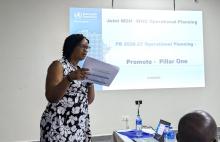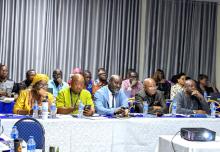MoH and WHO Sierra Leone conclude joint planning meeting for 2026–2027 workplans
Freetown, Sierra Leone – 15 October 2025
The Ministry of Health (MoH) and the World Health Organization (WHO) have successfully concluded a one-day joint planning meeting for the 2026–2027 Biennial Workplans, held at Brookfields Hotel in Freetown. This meeting marks the beginning of a renewed collaboration to implement WHO’s Fourteenth General Programme of Work (GPW14), which aims to promote, provide, and protect health and well-being for all people, everywhere.
The meeting convened 72 participants, including senior officials from the Ministry of Health, such as the Chief Medical Officer, Permanent Secretary, Deputy Chief Medical Officers, Directors, and Programme Managers, as well WHO Sierra Leone Representative and technical teams. Discussions focused on aligning WHO plans with national priorities, emphasizing high-impact, cost-effective interventions, and strengthening transparency, accountability, and partnership effectiveness.
In his opening remarks, WHO Representative Dr George Ameh highlighted the significance of the meeting as a strategic shift toward country-owned, integrated, and results-based planning.
“This meeting sets the foundation for a robust and responsive health strategy for the next biennium,” said Dr Ameh. “It reinforces WHO’s commitment as a trusted partner to support the Ministry of Health in delivering on national health priorities for advancing universal health coverage.”
Dr Ameh further emphasized that WHO’s plans are fully aligned with the Ministry’s vision for a transformative healthcare system that delivers quality services across all life stages. He noted that this vision resonates with the Regional Director’s manifesto, which focuses on investing in strong foundations for universal health coverage, building resilient health systems, modernizing healthcare delivery, and transitioning from dependence to sovereignty. Acknowledging global financial constraints, Dr Ameh encouraged participants to adopt innovative and strategic approaches to planning, ensuring maximum impact despite funding challenges.
Deputy Chief Medical Officer Dr Mustapha Kabbah underscored the critical role of data in guiding decisions, responding to emergencies, and monitoring progress.
“As we plan for the next biennium, data must remain at the heart of everything we do,” he said. “Without reliable and accessible data, we cannot effectively prioritize or respond to the health needs of our population.”
Dr Kabbah also highlighted pressing health concerns such as road traffic accidents, antimicrobial resistance, malnutrition, and the effects of climate change. He commended WHO’s ongoing technical support and called for enhanced community engagement and coordination to address these challenges.
The 2026–2027 Biennial Workplans will prioritize strengthening primary health care, improving access to quality services, tackling communicable and noncommunicable diseases, reducing preventable maternal and child deaths and enhancing preparedness and resilience to health emergencies.
This joint planning process represents a significant step forward in the collaboration between WHO and the Ministry of Health. It ensures shared priorities, joint tracking of results, and strategic resource allocation - aligned with Sierra Leone’s national health strategies and global commitments to universal health coverage.
In their closing remarks, Dr Ameh and Dr Kabbah urged technical teams to finalize the workplans, ensuring they address the specific needs and priorities of Sierra Leone’s health sector. They agreed to review the final plan ahead of its joint signing by the Minister of Health and the WHO Representative by mid-November 2025. Additionally, they committed to establishing regular meetings for joint monitoring and implementation tracking throughout the 2026–2027 biennium.
By working together through a unified, well-coordinated plan, WHO and the Ministry of Health are paving the way for a more efficient, accountable, and results-driven health system in Sierra Leone, one that saves lives and builds resilience for the future.





